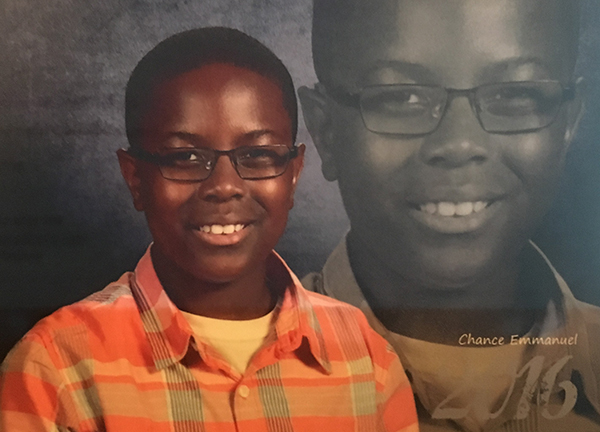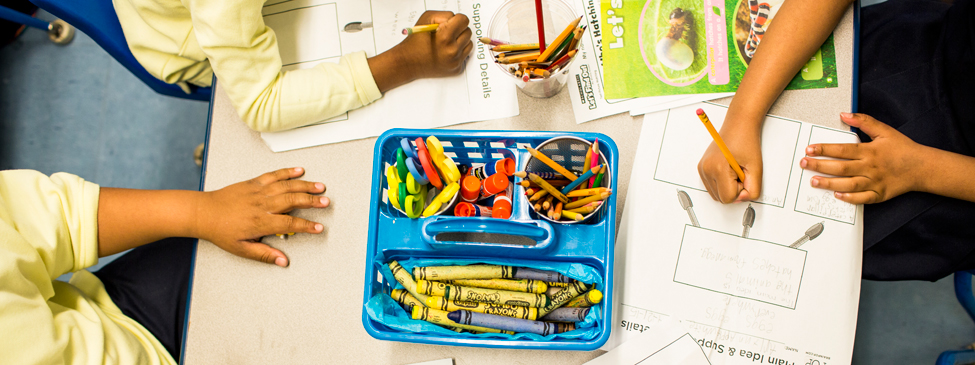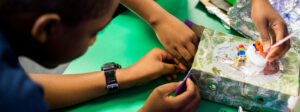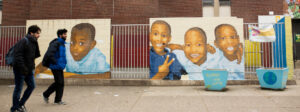At TNTP, we’re focused on improving school experiences for kids across the country—which means we spend a lot of time talking to people on the front lines of this work (district and school leaders, teachers, and parents, for example). But it’s easy to forget just how much we can learn from kids themselves, especially about important issues like diversity, school discipline, and access to challenging instruction. We recently sat down with Chance, a fourth-grader who just relocated to a new school and city with his family. (Full disclosure: Chance’s mom is a TNTP staff member.) Chance graciously took time out of his spring break to speak with us about his experience in school—and trust us, this kid is going places.

So your mom told me you guys just moved. Where did you live before?
We’re in Texas now, but we used to be in Atlanta, Georgia. I like it a lot. It’s a lot warmer.
You changed schools in the middle of the year, too. What was that like?
At first, I was pretty nervous.
What made you nervous?
Well, when I first stepped in the classroom, I was the only African American. People were just staring at me wherever I went. When I rode the bus I was nervous because everyone on there was whispering, “Is he a new kid?”
What did that feel like?
Like they kind of didn’t want me there.
What was your old school like?
I definitely felt more comfortable. In Georgia, it was very diverse. It wasn’t just African American or a certain race. It was all races in the classroom.
Why do you think it’s valuable to have a diverse group of students in the classroom?
In Georgia, African-American kids stood up for each other. I notice there’s more of a chance for people to make fun of you when you’re the only one. Don’t get me wrong, I have a bunch of friends who are not African American and they will help me in class. But I think it’s just better that more people have experiences with different kinds of people. Because you’re going to meet different people in life, so you might as well get used to different, diverse people.
How about your teachers? How do your teachers in your old school compare to this new school?
The difference is down here, I usually teach my teacher things. Like she didn’t know the box method for multiplication, so I showed her. And she was like, “Oh, that’s another method you can do,” but she never explained it to the class until we got close to a multiplication test. On the other hand, my teacher in Atlanta knew that. She taught me all of that.
My teacher here just tells us to do the work. In Georgia, our teacher read things until she made sure we understood. I think she knew what she was teaching better.
Your mom also mentioned your new teacher treats you a bit differently. Can you talk more about that?
I’ll give you an example. A few weeks ago, we were in class and this one kid asked, “Why do we always have to listen to songs?” And the teacher said, “Because I like it.” And then I whispered, “Because we like it, too.” And I got in trouble for it. But the first kid, on the other hand, didn’t get in trouble, even though he said, “That is true, we do all dance to it.” He got a warning. Then he said “I’m sorry, jeez,” and he got another warning. I never got a warning—I just got in trouble and the teacher took away one of my coins that allow me to participate in fun Fridays. When kids get warnings and I don’t, I feel that I’m more disliked.
At TNTP, we’re thinking about different ways to give boys and young men of color, like yourself, a better school experience. What are some things you would change about school if you could?
We’re not being pushed to our full potential most of the time. Down here, when we do science stations, all we do is the actual experiment and then we talk about it. On the other hand, in Georgia, we had to take notes, and label diagrams and stuff. We still did the experiment, but that was last—after we knew what we were going to do. We also wrote down what we did when we were done.
So do you feel like you’re not pushed as much as you could be? What would you do to change that?
I would definitely like to do more homework. But the homework isn’t really challenging—it’s just way too easy and we don’t get as much as we should. I’d like to get more math, writing, and reading every day, and less worksheets and a report that’s due every week. For example, we have writing boot camp right now and I love it. We meet up in the main base, our hallway, then we go to our class bases with our teachers aka our commanding officers. Then we write. We learn more about writing beginning, middles, and endings.
What other ideas do you have to make school better?
Make it harder to get rewards and have consequences if you don’t have your work. Get to know students better. Learn their character. We can also start a new group of “knerds,” probably.
What’s a knerd?
A Knowledgeable, Educated, Relentlessly Driven Scholar—that’s what knerds are. I make it cool to be a knerd. A knerd is someone who is cool and smart. We pretty much rule the world. Barack Obama is a knerd—and Cam Newton.
Read more about students’ experiences in school in The Opportunity Myth—then take the first step by requesting your own free action guide featuring tools and advice to help more students in your community have worthwhile experiences in school.





